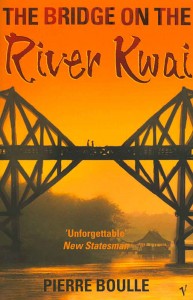 Here at WoWasis, we’re not averse to reviewing an older book, especially one that was written a couple of generations ago. It’s well past its original buzz, which, in the case of this book, includes a major motion picture as well. Fact is, many in today’s generation haven’t read it. And it’s timeless.
Here at WoWasis, we’re not averse to reviewing an older book, especially one that was written a couple of generations ago. It’s well past its original buzz, which, in the case of this book, includes a major motion picture as well. Fact is, many in today’s generation haven’t read it. And it’s timeless.
We just finished reading Pierre Boulle’s The Bridge on the River Kwai (1952, ISBN 978-0-09-944502-9) as the sun set over the River Kwai in Thailand. So we’ve got tons of additional atmosphere . But Boulle’s fictional chronicle of one of the more legendary occurrences in World War II stands the test of time as a work of psychological fiction that addresses the basic human issues of hubris, loyalty, duty, and honor.
Initially, at issue is Colonel Nicholson’s insistence on military protocol after capture by the Japanese. His insistence on morale-boosting by helping the enemy to build a railroad bridge becomes apparently compulsive, until he finally makes a fatal choice of which side is more deserving of his own personal loyalty.
Boulle has a fascinating way with prose. We were struck by the artistry of this “sentence as paragraph” on page 169, describing Colonel Nicholson:
With a clear conscience, at peace with the universe and with God, gazing through eyes that are bluer than the tropical sky after a storm, feeling through every pore of his ruddy skin the satisfaction of the well-earned rest that is due to any craftsman after a difficult task, proud of having overcome every obstacle through his personal courage and perseverance, glorifying in the work accomplished by himself and by his men in this corner of Siam which he now feels almost belongs to him, light at heart at the thought of having shown himself worthy of his forefathers and of having contributed a far from common chapter to the eastern legends of empire-builders, firmly convinced that no one could have done the job better, confirmed in his certainty of the superiority of his own race in every field of activity, glad of having furnished ample proff of this during the last six months, bursting with the joy that makes every commander’s effort worth while once the triumphant result is there for all to see, drinking the cup of victory in tiny sips, delighted with the quality of the construction, anxious to see for himself, and for the last time, the sum total of its perfection compounded of hard work and intelligence, and also in order to carry out the final inspection, Colonel Nicholson strode with dignity across the bridge over the River Kwai.
Today, you can take a boat tour down the River Kwai, visit the Death War Museum (formerly the Thailand-Burma Railway Centre), ride on the Death Railway, walk through the blasted remains of the Hellfire pass, visit the site of the famous bridge in the city of Kanchanaburi, and immerse yourself in the history of the river and its famous bridge. This book, which generated much of the interest in making those spots accessible, is a page-turner. At only 186 pages, you can easily begin and finish it while you’re in the River Kwai area. Buy it now at the WoWasis estore, powered by Amazon.
Leave a Reply